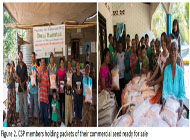Planting good quality seed is a key component for improving productivity in all agricultural environments and is especially important in developing countries.
The current large yield gap between improved seed and farmer-saved seed is due to varietal yield differences, low seed replacement, poor seed quality and low adoption of good agronomic practices.
In Timor-Leste, quality seed of improved varieties has been shown to contribute 15 -131% higher yields than traditional varieties. Despite these benefits, availing improved seed in sufficient quantities at planting time is a challenge for many farmers. The key problem faced by government agencies in developing countries is the high costs of multiplication and distribution of quality seed.
File Size: 869 kb

